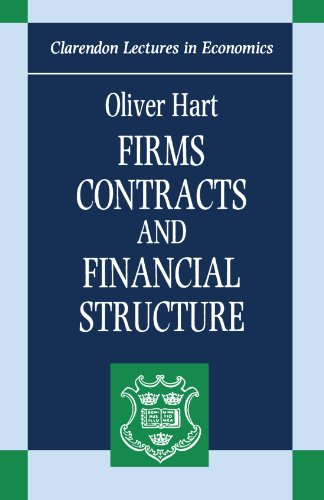Firms, contracts, and financial structure book
Par carter kristin le jeudi, juin 30 2016, 23:01 - Lien permanent
Firms, contracts, and financial structure by Oliver Hart


Firms, contracts, and financial structure ebook
Firms, contracts, and financial structure Oliver Hart ebook
Publisher: OUP
Format: pdf
ISBN: 0198288816, 9780198288817
Page: 239
This work uses recent developments in the theory of incomplete contracts to analyze a range of topics in organization theory and corporate finance. "This book, which synthesizes most of Oliver Hart's work since 1980, provides a clear introduction to the modern theory of the firm, and ultimately a very compelling answer to. FIRMS CONTRACTS AND FINANCIAL STRUCTURE on English sites. In particular, the question dealt with here is whether policies aiming to promote job stability could have an impact on a firm's capital structure and the ability to respond to negative shocks and survive. For those interested in the economics of contracting: Oliver Hart, Firms, Contracts and Financial Structure (1995). Hilborn, Robert C., “Sea Gulls, Butterflies, and Grasshoppers: A Brief. Bond covenants exist to restrict these games that shareholders might play, but bond contracts cannot prevent all eventualities. An interesting development of the 1980s, however, was the John Graham and Campbell Harvey (2001) surveyed chief financial officers to gather information about their perspective on the determinants of their firms' financial structure and found support for both the trade-off theory and the pecking order view. Herbet Simon, "A Formal Theory of the Employment Relationship," Econometrica, July 1951. Like: Extensive list of legal and financial experts worldwide. Hart, Oliver, Firms, Contracts and Financial Structure, Oxford: Clarendon. In a footnote on page 5 of his 1995 book "Firms Contracts and Financial Structure" Oliver Hart wrote,. Contemplating the rising levels of temporary employment, Spain introduced subsidies to firms for converting temporary contracts with existing workers into permanent ones and for hiring new workers on permanent contracts. But if human capital is so important, elementary property rights economics tells us that workers, not capitalists, should control firms.